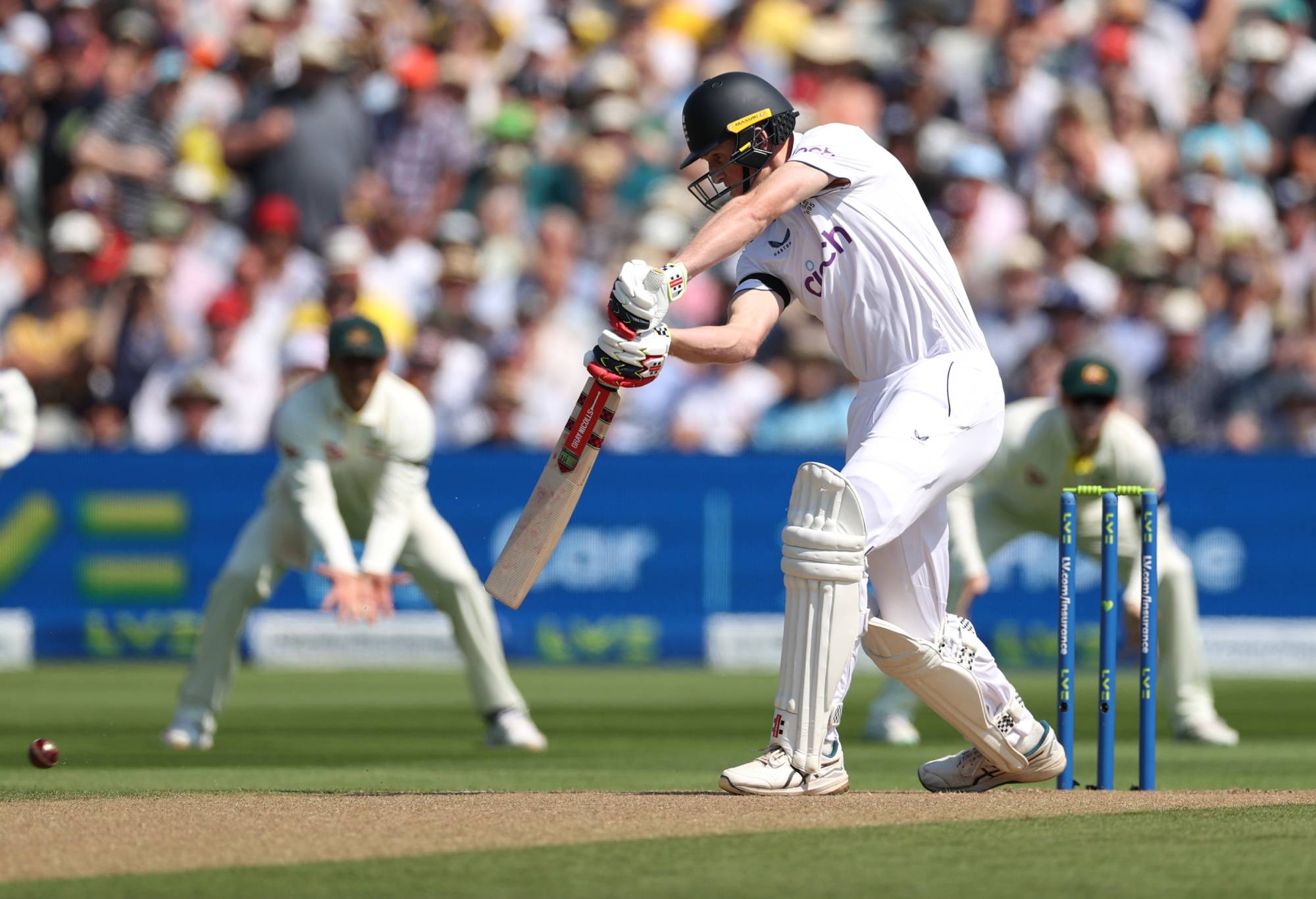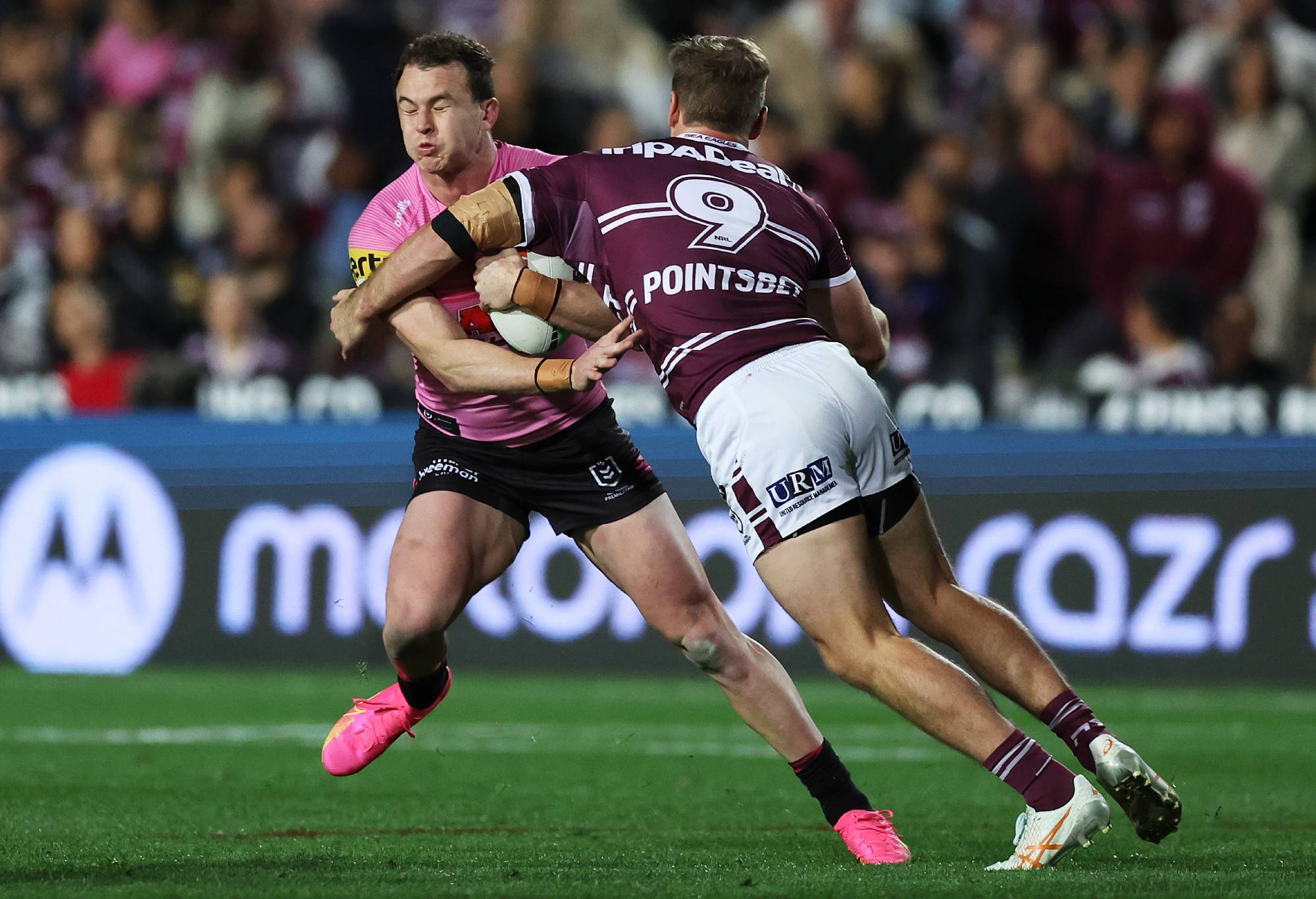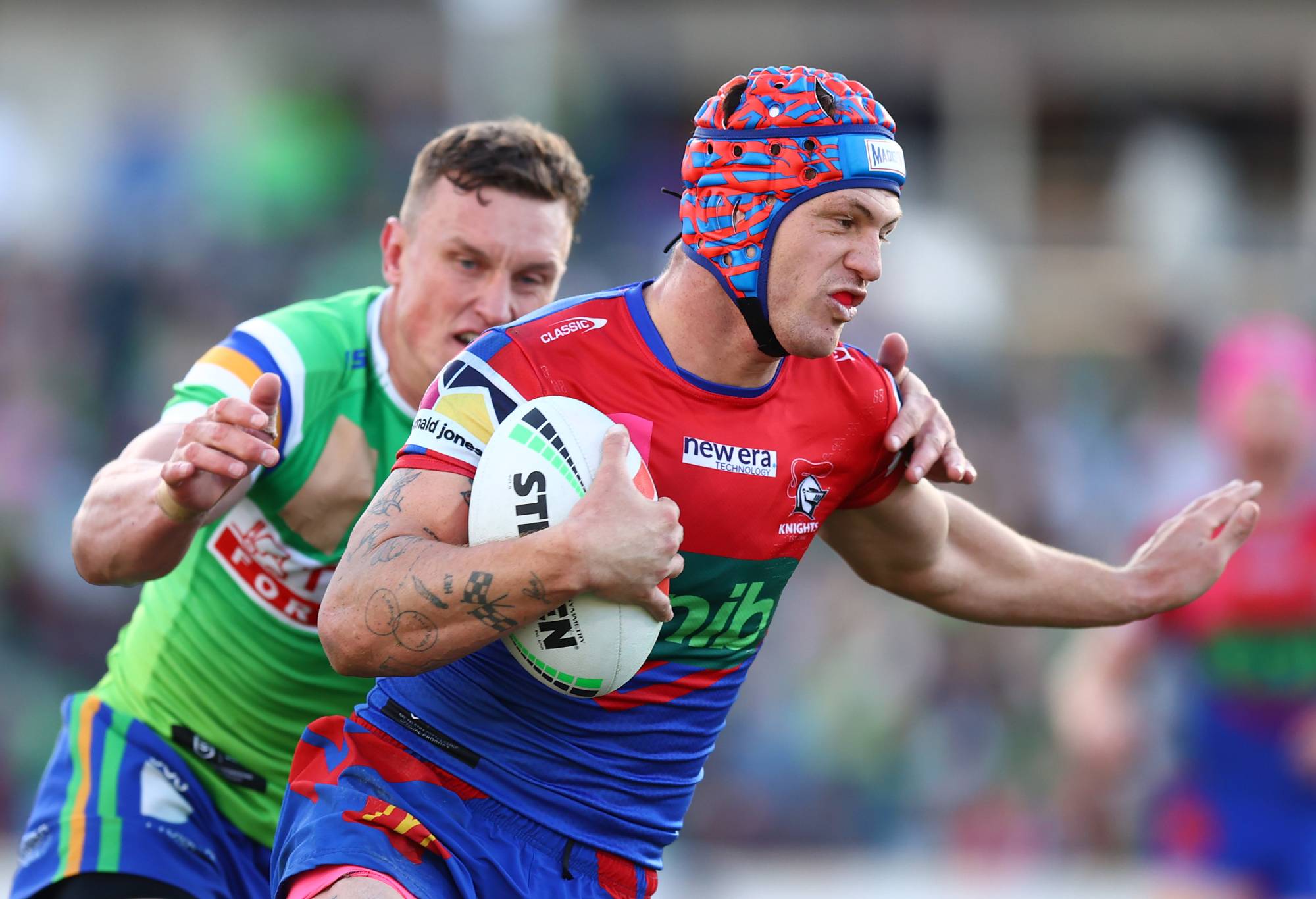As the 2023 NRL season has gone on, the feeling of deja vu has set in. To paraphrase the football joke: it’s a simple game, rugby league: you play for 80 minutes and then the Panthers win.
Approaching the finals, Penrith have looked more and more ominous, culminating in their late capture of the minor premiership on Saturday with a romp over the Cowboys.
The notion of the invincible Panthers took a bit of battering earlier in the year, when St Helens, for whom the same joke might be made in the UK, briefly upset the applecart.
Early year defeats to the Broncos, Eels, Rabbitohs and Tigers had us all feeling like the lustre might have worn off the much-gilded Mountain Men.
How wrong we were: since then, they’ve gone 13-2, losing only to the Cowboys in Golden Point during Origin and when resting players against Parramatta.
Since the advent of the Six Again, the Panthers have, ever so slightly, regressed. They lost one regular season game in 2020, three in 2021, four in 2022 and five in 2023.
In that time, however, they’ve also improved their record in finals football, going from Grand Final defeat to victory the long way round to straight up victory.
The Cleary system remains infrangible. No team has consistently been able to solve the Panthers problem, even though every team knows exactly what they are going to do.
As we head into the finals, seven more opponents will get their crack, and while all have their own distinct play styles, none have proven capable in the past of disrupting Penrith – and the Panthers make everyone play their way.
If coaches are looking for a spot of inspiration, they might find it in an unusual place.
They’ll have been busy through the bulk of the winter, but in their downtime, they might well have caught some of The Ashes – and come face-to-face with Bazball.
For all the handwringing about moral victories, balls, stumpings and whether or not Test cricket has been saved, there can be no doubting the success of England’s new style, which turned has a team that was thoroughly flogged in Australia to one that is now among the best in the world.
What is most misunderstood about Brendan McCollum and Ben Stokes’ playing philosophy is the part that NRL coaches can draw upon: it’s not about the sixes and fours, or the weird field placements, or the strange declarations, it’s about pressure transfer and risk management.
When England attack the ball from the first delivery, it is because they immediately want to put pressure on their opponent and because they calculated that the best way to survive that early stage is through aggression, given how frequently their openers were getting out defending the moving ball.
So you thrash, you take a few risks, and if it works, the fielding side has to react and, invariably, ends up with more men on the boundary and fewer in the slips, which allows for a far less risky style of batting thereafter.
Remember, Australia hit more boundaries in the Ashes than England did – the bulk of the hosts’ scoring was done by treating Test matches like they were the middle overs of an ODI.

(Photo by Ryan Pierse/Getty Images)
In sports analytics terms, Bazball was a pure exercise in manipulating variance and game state.
You take risks early in an attempt to force pressure onto your opponent, acknowledging that sometimes it will go wrong, because you know that a chaotic game gives you the best chance of winning.
It looks like pure vibes, but there’s hard-headed analysis behind it. The seven other finals teams would do well to take note, because playing ‘normally’ will only end up one way this year.
This was the basis of analysis ahead of last year’s finals, and nothing much has changed, because the Panthers are still there.
The variance aspect is vital, because while luck evens out over a season, it can end them in a second in the finals. For teams that will inevitably begin as outsiders, those vicissitudes are an equaliser, a part of the game that brings them closer to the Panthers.
It’s not to say that they’re all a puncher’s chance – obviously they are better than that – but stylistically, a more chaotic game will benefit anyone playing Penrith more than it will the Panthers themselves.
Cleary’s men are masters of controlling games and making everyone else adapt around their system, and in the process, minimising the effect that variance can have.
They’re not perfect – see their defeat to the Wests Tigers for example – but they’re about as close as it is realistically possible to get.
On seven occasions this year, including their minor premiership clincher against the Cowboys, the Panthers have kept a side scoreless for a half, and more often than not, it’s the first half.
The mind turns to their first half against Manly in Round 6, where the Sea Eagles didn’t play all that badly and got absolutely trounced anyway, 32-0 at half time.
They have kept the Warriors Broncos, Raiders and Roosters scoreless for a half, the Sharks scoreless entirely and lead 20-6 over the Storm. The only finals side they haven’t blown away in a half is Newcastle, though the Panthers have beaten them twice, including with half a team in Origin.
None of those sides are bad teams, but against such a well-oiled machine, they didn’t stand a chance.
What they can do – and, indeed, what Manly did do in their later meeting – is throw a bit of Bazball at it.
They threw lots of shape in attack, challenged the line speed horizontally and early in the set and showed no fear in putting on plays from deep. They refused to enter into the arm wrestle, choosing instead to play all-out offense from the first whistle. It was controlled, intentional chaos.

(Photo by Mark Metcalfe/Getty Images)
That doesn’t mean bringing back the kicking duel, as Reuben Garrick tried to, but more that they admitted from the off that trying to play conventionally would lead to defeat. If you don’t like what your opponent is saying, you change the conversation.
Parramatta have benefitted from this a little, too, but they haven’t embraced chaos like Manly did.
Theirs is more of ‘styles-make-fights’ advantage, in that how they attempt to play every week is quite unique and hits at a few of the Panthers’ weak spots, namely through second phase play and superior long kicking.
Nobody else left in the finals can play like Parra can, but everyone could learn something from Manly’s approach.
The Sea Eagles didn’t get much variance that night – statspeak for luck – but they did do plenty for the game state, forcing the Panthers to go places that they didn’t want to go. It takes a lot to throw Penrith off their stride, but they managed it.
Given that Manly are a middling team that didn’t make the finals, the hope for everyone else has to be that one of them can do what they did, but better.
If the other contenders approach a meeting with Penrith like that in the early stages, rather than trying to build into it, things could get very interesting. It’s a cliche in rugby league that you have to earn the right to play that way, but really, in this situation, you’re asking to lose.
The second part of the Bazball gambit works, too. If a team can throw the Panthers off their stride, they only have to do it for a while to bring the game state factor in.
Game state is the analytics term for scoreboard pressure, the way that a side reacts to the condition they are in at the time within a match.
The stats show that most results at the hour mark hold to the end of the 80 minutes, and experience tells that the longer a side is behind, the more they take risks to chase the game.

(Photo by Mark Nolan/Getty Images)
In these circumstances, it makes sense to play like you’re behind for the first 20 minutes rather than the final 20, because the way Penrith want to play is to grind for the opening period, tire out their opponents and then run over them late. The purpose for opposing sides has to be to avoid that situation.
The Panthers’ rarely go behind and when they do, rarely by much. It takes a lot to score against them, but such a large part of that is predicated on the opposition not being close to their line to start with. It’s all territory.
If a side can attack from deep, and keep doing it, it changes that equation. Points on the board bring pressure that Penrith rarely have to face, and in the most pressurised time of year, that will go a long way.
One of the great strengths of Cleary and his team is that they so rarely panic or deviate from their style, but they’re also not often asked hard enough and early enough to make them change paths.
So can a finals team actually do it, and if they can, who will it be? The Broncos and Cronulla would be the obvious candidates, given how they attack most of the time anyway is relatively cavalier and tries to take advantage of their pace out wide.
The Roosters can certainly do it. Trent Robinson described the change in his side’s attack as being based around embracing improvisation, and it would come with the benefit of having one of the better goalline defences that can back up mistakes that will inevitably be made.
Melbourne love the grind and were the past masters of it, so it would take a lot for Craig Bellamy to change his tack. That said, as much as he might back his men to go deep with anyone, the evidence suggests that doing so is a one way passage to defeat.

(Photo by Robert Cianflone/Getty Images)
For the Warriors and Raiders, this is going to be a big ask. Theirs is inherently a more conservative style and while that might suit them in the grind of finals footy against other teams, they’ll likely get thumped by trying to out-Penrith Penrith.
Newcastle might be the most interesting option. They have absolutely nothing to lose and a succession of flair players, particularly in the backs, who could very much ape what Manly did.
If they get to face Penrith, they’ll already have won in their minds and will be empowered to do something completely different. In Jackson Hastings they have a half in the Daly Cherry-Evans mold and in Kalyn Ponga, a genuine X factor who can scare Penrith.
The bookies don’t give many a chance: the Panthers are $2.35 at PlayUp to make it three in a row, pretty much where they were last year, when nobody came close, with the Penrith winning by 16 or more in each finals game.
This year, it’s the Broncos at $3.25, on the assumption they’ll at least make the Grand Final, then fresh air, then the Storm, then more fresh air, then everyone else.
With odds like that, it’s going to take someone to try something new to avoid a repeat of the last two years. Transferring pressure back onto the Panthers, just like England’s Bazballers, is a good way to start.
































































































